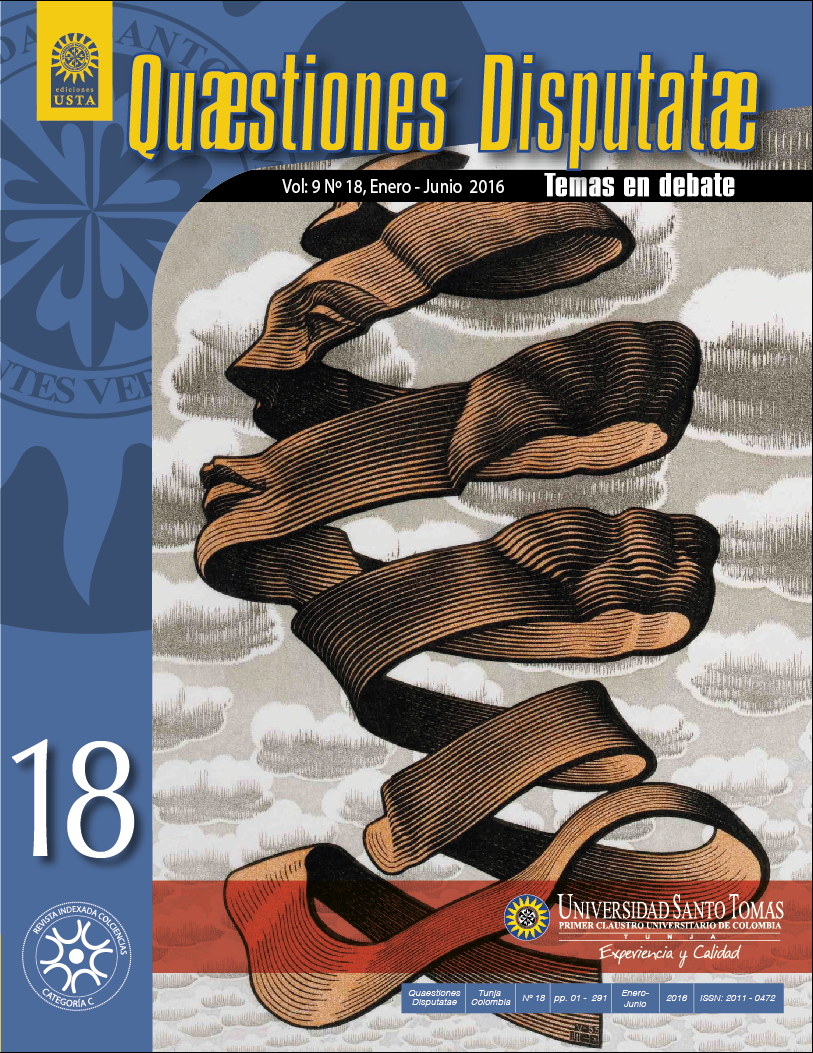Hobbes: the relationship between reason, passion, technique and civil science
Main Article Content
Abstract
That which is technical must be subordinate to that which is political or otherwise it converts itself into an autonomous instance that alienates man from his essence, his political being, leading to the dehumanisation of man. The emergence of the relationship between technique and politics goes back to the beginning of modern political thought, particularly the civil science postulated by Hobbes. In this essay, the author will present this relationship in three stages. In the first two, the conception of the individual as a being that is cognoscente and passionate is demonstrated. In the third stage the author will present the relationship proposed by Hobbes between science, man, technique and politics.
Article Details
How to Cite
González-Granado, F. (2016). Hobbes: the relationship between reason, passion, technique and civil science. Quaestiones Disputatae: Temas En Debate, 9(18), 133-157. Retrieved from http://revistas.ustatunja.edu.co/index.php/qdisputatae/article/view/1047
Section
Artículos Núm. 18
De acuerdo a la Licencia Creative Commons Atribución-No Comercial-Sin Derivar 4.0 Internacional, se autoriza leer, descargar, copiar, distribuir, imprimir, buscar o enlazar los textos completos de estos artículos, siempre y cuando se conceda el crédito a los autores de los textos y a la Revista Quaestiones Disputatae: temas en debate, como fuente de publicación original. No se permite el uso comercial de copia o distribución de contenidos, así como tampoco la adaptación, derivación o transformación alguna de estos sin la autorización previa de los autores y de la dirección de Quaestiones Disputatae: temas en debate.

Esta obra está bajo una licencia de Creative Commons Reconocimiento-NoComercial-SinObraDerivada 4.0 Internacional.
References
Astorga, O. (1999). El pensamiento político moderno. Caracas, Venezuela: Ediciones de la Biblioteca de la Universidad Central de Venezuela.
González, F. (2012). Thomas Hobbes: historia y ciencia civil. Bogotá, Colombia:
Universidad Santo Tomás. Colección Summa cum laude.
Greenleaf, W. (1972). Hobbes: the problem of interpretation. En Cranston, Hobbes and Rousseau (5-36). New York, EE.UU: Anchor books.
Hernández, J. (2002). El retrato de un dios mortal. Barcelona: Anthropos.
Hobbes, Th. (1994). Three Discourses. Chicago: Chicago University Press.
________. (2000). De Cive [DC]. Madrid, España: Alianza.
________. (2005). Elementos de Derecho Natural y Político [EL]. Madrid, España: Alianza.
________. (2008). Leviatán [L]. México: Fondo de Cultura Económica.
________. (2010). De Corpore. Primera sección de los elementos de filosofía [DCo]. Valencia, España: Pre-textos.
Macpherson, C. (1962). The Political Theory of possessive individualism. Hobbes to Locke. Oxford, England: Oxford University Press.
Rodríguez, C. (2008). Epistemología y lenguaje en Thomas Hobbes. Construcción de conceptos y unidad epistémica. Bogotá, Colombia: Universidad de La Salle.
Saravia, G. (2011). Thomas Hobbes y la filosofía política contemporánea: Carl Schmitt, Leo Strauss y Norberto Bobbio. Madrid, España: Dickinson.
Schmitt, C. (2008). El Leviatán en la teoría del Estado de Thomas Hobbes. México D.F: Distribuciones Fontamara.
________. (2009). Teología política. Madrid, España: Trotta.
Sorell, T. (1996). The Cambridge companion to Hobbes. New York, EE.UU: Cambridge University Press.
Strauss, L. (2006). La filosofía política de Hobbes: su fundamento y su génesis. Buenos Aires, Argentina: Fondo de Cultura Económica.
Tönnies, F. (1932). Vida y doctrina de Tomás Hobbes. Madrid, España: Revista de occidente.
Tuck, R. (2002). Hobbes A very Short Introduction. New York, EE.UU: Oxford University Press.
Watkins, J. W. (1965). Hobbes’ System of Ideas. London, England: Hutchinson University Library.
González, F. (2012). Thomas Hobbes: historia y ciencia civil. Bogotá, Colombia:
Universidad Santo Tomás. Colección Summa cum laude.
Greenleaf, W. (1972). Hobbes: the problem of interpretation. En Cranston, Hobbes and Rousseau (5-36). New York, EE.UU: Anchor books.
Hernández, J. (2002). El retrato de un dios mortal. Barcelona: Anthropos.
Hobbes, Th. (1994). Three Discourses. Chicago: Chicago University Press.
________. (2000). De Cive [DC]. Madrid, España: Alianza.
________. (2005). Elementos de Derecho Natural y Político [EL]. Madrid, España: Alianza.
________. (2008). Leviatán [L]. México: Fondo de Cultura Económica.
________. (2010). De Corpore. Primera sección de los elementos de filosofía [DCo]. Valencia, España: Pre-textos.
Macpherson, C. (1962). The Political Theory of possessive individualism. Hobbes to Locke. Oxford, England: Oxford University Press.
Rodríguez, C. (2008). Epistemología y lenguaje en Thomas Hobbes. Construcción de conceptos y unidad epistémica. Bogotá, Colombia: Universidad de La Salle.
Saravia, G. (2011). Thomas Hobbes y la filosofía política contemporánea: Carl Schmitt, Leo Strauss y Norberto Bobbio. Madrid, España: Dickinson.
Schmitt, C. (2008). El Leviatán en la teoría del Estado de Thomas Hobbes. México D.F: Distribuciones Fontamara.
________. (2009). Teología política. Madrid, España: Trotta.
Sorell, T. (1996). The Cambridge companion to Hobbes. New York, EE.UU: Cambridge University Press.
Strauss, L. (2006). La filosofía política de Hobbes: su fundamento y su génesis. Buenos Aires, Argentina: Fondo de Cultura Económica.
Tönnies, F. (1932). Vida y doctrina de Tomás Hobbes. Madrid, España: Revista de occidente.
Tuck, R. (2002). Hobbes A very Short Introduction. New York, EE.UU: Oxford University Press.
Watkins, J. W. (1965). Hobbes’ System of Ideas. London, England: Hutchinson University Library.

